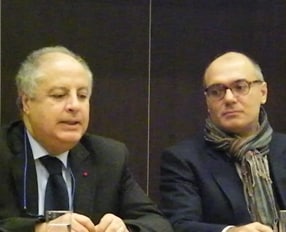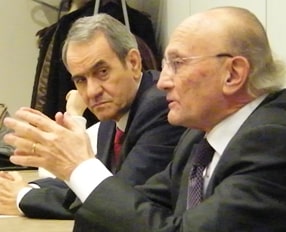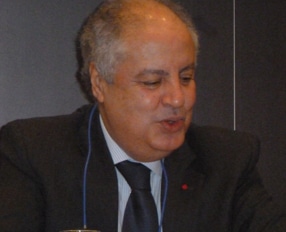
In Rome this past January 20th, the first meeting of the new year was organized for the Center of Studies of the Middle East in Italy (Centro de Estudios de Oriente Medio en Italia) with the objective of delving deeper into a different theme with help from experts in the field.
The breakfast’s theme was “A new politic for the Mediterranean. Signs from Morocco” and featured Abouyoub Hassan, Ambassador of the Kingdom of Morocco in the Quirinale.

The Ambassador explained the “Moroccan model” that was formed little by little since the country gained independence in 1956. In that moment, Morocco was a country with a high poverty index and had one of the highest rates of illiteracy among its population. In a little more than fifty years, however, the country has achieved considerable progress in stability and economic growth.
“Morocco has avoided the process of the Arab Spring, because it didn’t need it: the country has demonstrated the capacity to make reforms,” stated the Ambassador, defending Morocco as a “Land of consensus.” The youth represent 60% of the population and have the capacity to be politically active, enjoying participation that is sanctioned by the Constitution, and includes women.

“Politics are strongly influenced by the educational system in the country and we have to admit the failure of educational systems in the Middle East, both from quantitative and qualitative perspectives,” and continued: “In Morocco we have begun a profound reform in this area, a few years ago, in fact, the university system was given autonomy, which means that state control is less and universities have the freedom to open themselves to the outside world.”
Because of this, the model of Morocco is unique in the area, the euro-Mediterranean vocation of the country is, in fact, the result of its geographic position, economy, history, adhesion to humanist values of progress, reason and tolerance: “a clear separation of powers means that it is not a problem for us to separate politics from religion.”
Finally, the Ambassador responded to a question about immigration from Sub-Saharan Africa, a phenomenon that is also affecting Morocco: “demographics are the motor of the economy; Europe, after having lost this capacity, is not capable of growing in global competitiveness.” For that reason, the constant immigration occurring in the country is considered a positive phenomenon, more so in that recent Moroccan politics have moved towards a legalization of resident permits “having produced, in just two weeks, a register of 250,000 people.” Immigration, concluded the Ambassador, creates the “diversity” that has always been the source of Morocco’s wealth.

